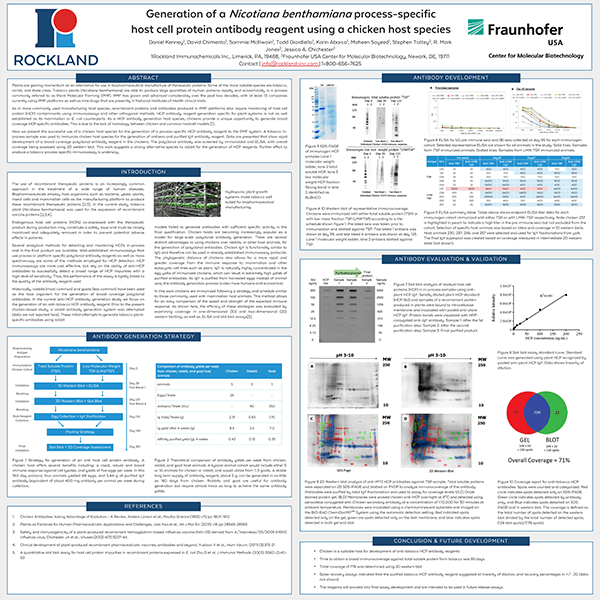Generation of a Nicotiana benthamiana process-specific host cell protein antibody reagent using a chicken host species
Plants are gaining momentum as an alternative for use in biopharmaceutical manufacture of therapeutic proteins. Some of the more notable species are tobacco, carrot, and thale cress. Tobacco plants (Nicotiana benthamiana) are able to produce large quantities of human proteins rapidly and economically in a process commonly referred to as Plant Molecular Farming (PMF). PMF has grown and advanced considerably over the past two decades, with at least 13 companies currently using PMF platforms as well as nine drugs that are presently in National Institutes of Health clinical trials.
As in more commonly used manufacturing host species, recombinant proteins and antibodies produced in PMF platforms also require monitoring of host cell protein (HCP) contaminants using immunoassays and other orthogonal methods. HCP antibody reagent generation specific for plant systems is not as well established as its mammalian or E. coli counterparts. As a HCP antibody generation host species, chickens provide a unique opportunity to generate broad coverage HCP specific antibodies. This is due to the lack of homology between chicken and common hostcell models [1].
Here we present the successful use of a chicken host species for the generation of a process-specific HCP antibody reagent to the PMF system. A tobacco inprocess sample was used to immunize chicken host species for the generation of antisera and purified IgY antibody reagent. Data are presented that show rapid development of a broad coverage polyclonal antibody reagent in the chickens. The polyclonal antibody was screened by immunoblot and ELISA, with overall coverage being assessed using 2D western blot. This work suggests a strong alternative species to rabbit for the generation of HCP reagents. Further effort to produce a tobacco process-specific immunoassay is underway.
